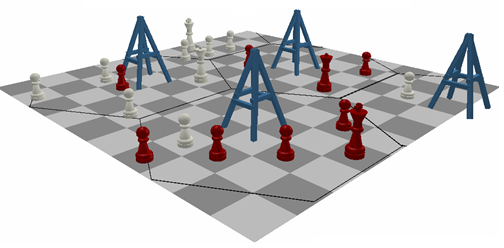
 |
Analysis and Design of Cognitive Radio Networks Using Game Theory | ||
different defenitions of Cognitive Radio:
Joseph Mitola: “A radio that employs model based reasoning to achieve a specified level of competence in radio-related domains.” [Mitola_99]
Simon Haykin : “An intelligent wireless communication system that is aware of its surrounding environment (i.e., outside world), and uses the methodology of understanding-by-building to learn from the environment and adapt its internal states to statistical variations in the incoming RF stimuli by making corresponding changes in certain operating parameters (e.g., transmit-power, carrierfrequency, and modulation strategy) in real-time, with two primary objectives in mind:
• highly reliable communications whenever and wherever needed;
• efficient utilization of the radio spectrum." [Haykin_05]
FCC : “A radio that can change its transmitter parameters based on interaction with the environment in which it operates.”[FCC_05]
ITU Wp8A : “A radio or system that senses and is aware of its operational environment and can dynamically and autonomously adjust its radio operating parameters accordingly.”
IEEE USA : “A radio frequency transmitter/receiver that is designed to intelligently detect whether a particular segment of the radio spectrum is currently in use, and to jump into (and out of, as necessary) the temporarily-unused spectrum very rapidly, without interfering with the transmissions of other authorized users.”[IEEEUSA_03]
IEEE 1900.1 group : “A type of radio that can sense and autonomously reason about its environment and adapt accordingly. This radio could employ knowledge representation, automated reasoning and machine learning mechanisms in establishing, conducting, or terminating communication or networking functions with other radios. Cognitive radios can be trained to dynamically and autonomously adjust its operating parameters.”[IEEE 1900.1]
The Cognitive Radio Working Group : “A radio that has, in some sense,
(1) awareness of changes in its environment and
(2) in response to these changes adapts its operating characteristics in someway to improve its performance or to minimize a loss in performance.”
SDR Forum : “An adaptive, multi-dimensionally aware, autonomous radio (system) that learns from its experiences to reason, plan, and decide future actions to meet user needs.”
The Virginia Tech Cognitive Radio Working Group: “An adaptive radio that is capable of the following:
a) awareness of its environment and its own capabilities,
b) goal driven autonomous operation,
c) understanding or learning how its actions impact its goal,
d) recalling and correlating past actions, environments, and performance.” [VT CRWG]
While it appears to be unlikely that there will be a harmonization of these definitions in
the near future, an examination of the salient functionalities of these definitions, as
summarized in Table 1.1, reveals some commonalities among these definitions. First, all
of these definitions assume that cognition will be implemented as a control process,
presumably as part of a software defined radio. Second, all of the definitions at least
imply some capability of autonomous operation. Finally, the following are some general
capabilities found in all of the definitions:
1. Observation – whether directly or indirectly, the radio is capable of acquiring
information about its operating environment.
2. Adaptibility – the radio is capable of changing its waveform.
3. Intelligence – the radio is capable of applying information towards a purposeful
goal.
Main Definition of Cognitive Radio :
A cognitive radio is a radio whose control processes permit the radio to leverage
situational knowledge and intelligent processing to autonomously adapt towards some
goal.
 |